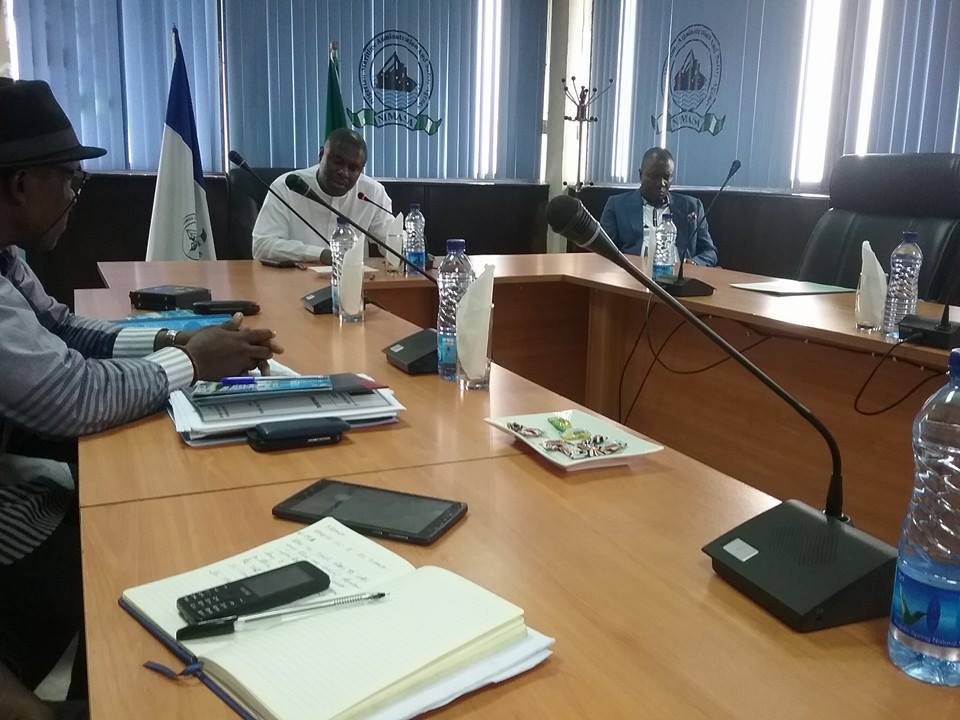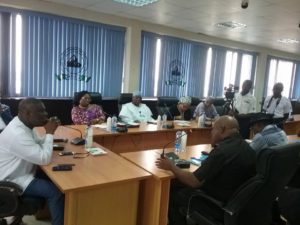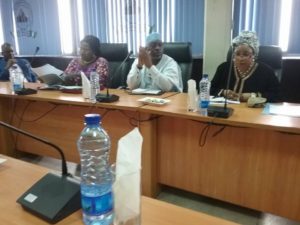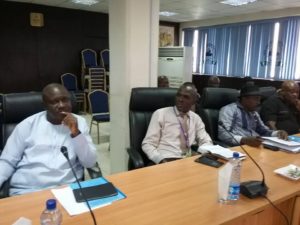The National Association of Government Approved Freight Forwarders (NAGAFF) has called on the Nigerian Maritime Administration and Safety Agency (NIMASA) to as a matter of urgency tackle the high freight charges on Nigeria bound cargo and the insecurity on the nation’s territorial waters.
The National President of NAGAFF, Mr. Oluwole Adeyemi who made this appeal during a courtesy visit by the Management of the association on the Director-General of NIMASA, Dr. Dakuku Peterside at the agency’s headquarters in Lagos Friday stated that this would go a long way in reducing cargo
diversion to neighboring ports in the sub-region.
According to Adeyemi,” The high freight charges on imports into Nigeria are part of the ways
through which Nigeria’s foreign reserve is depleted annually. The only reason often adduced to this is the insecurity in the Nigeria Maritime domain and by extension within the gulf of Guinea. As a result Nigeria importers are made to pay an estimated freight charges which the exporters impose to cover both his risk and that of the contracting carrier. The justification for the high charges is often to take care of the insurance premium meant to cover the vessel, crew and cargo against attacks by sea robbers and pirates. This is where the discrepancy between the freight rates paid by Nigerian exporters are far below the one paid by importers who bring goods to Nigeria.
“While a 40ft container meant for export to the Middle East pays freight of between $1,100 and $1,300, depending on the shipping line, a similar size of 40ft container of imported goods from the same location scheduled for Nigeria pays between $3,500 – $5,000 irrespective of other considerations
and including weight which has become an issue under the VGM of the IMO at the moment. The solution to this is not the call by industry stakeholders for the Government to insist that our exports both crude oil and non oil export goods should be based on CIF and all imports on FOB. A lot of
contributory factors account for the sales contract that is applicable to every transaction. Rather, the solution to this lies with the right authority to ensure that acceptable global industry standard practices are enforced in our sea borne trade. What the Agency needs to pursue is that freight charges should be paid locally and in local currency”.
He submitted that for Nigeria to achieve this, steps such as procurement of sea going vessels, recognition of the power that lies on who nominates the vessel for carriage as well as ensuring that the freight forwarding subsector occupies its rightful position in the maritime sector and the supply chain as a whole.
“Freight payment and collection are part of the functions which the freight forwarder renders. They are often the custodians of information relating to country’s annual freight earnings. This helps to keep the economy buoyant and the sustenance of the maritime industry especially in a non oil producing nation”, he said.
The NAGAFF boss observed that NIMASA in fulfilling its statutory responsibility in the area of training and capacity building should consider making it a point of duty to expose his members through regular
sponsorships to conferences and seminars both locally and internationally.
He said, “The dynamic nature of the maritime industry is such that requires constant updates, training and re-training of practitioners as dramatic changes occur both in government policy framework, international standard operating procedure and other regulatory compliances. This is another area of great concern among the challenges facing the Freight forwarding practice in the industry.
“It may interest you to know that at inception, NAGAFF established an Academy where majority of our members were trained. This institution folded up in 2006 as a result of inadequate funding. Currently our Association is affiliated with Redeemer’s University which is one of the training institutions approved by the Council for the Regulation of Freight Forwarding in Nigeria (CRFFN). However, part of our challenges in this arrangement has been the difficulties being faced by young and upcoming promising Freight forwarders to meet up with the astronomical school fees.
“Consequently, the enthusiasm of most forwarders who wish to advance their knowledge and skills are being whittled down. Since there is a subsisting provision made under relevant sections of the NIMASA Act to establish maritime institutions and the training of practitioners, we feel that such gesture is long overdue to be extended to those who provide freight forwarding services which are a critical component of the Maritime Sector and shipping in particular.
“The Maritime Academy of Nigeria Oron and other government approved maritime Institutions should upgrade their standards by creating the departments of freight forwarding and logistics services, in the same way as it is obtained in other maritime Academies and Universities across the globe. Good examples are the World Maritime University Melmo, Sweden and the Regional Maritime University in Ghana”.
Send your news, press releases/articles to info@primetimereporters.com. Also, follow us on Twitter @reportersinfo and on Facebook at facebook.com/primetimereporters or call the editor on 07030661526, 08053908817.





